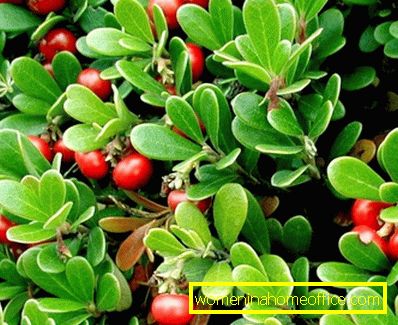Grass bear ears.
In antiquity, some nations considered grass ears bear sacred. It was used in ceremonies, cult ceremonies, and worn in an amber bottle to enlighten the mind and to treat mental disorders. In Tibet, the plant is used in meditation.
Bear ears grass: instruction
Bearberry (bear ears)- it is a constantly green shrub spreading along the ground. The leaves are dark green, dense. It blooms from May to June gently pink flowers. Fruits resemble small red berries, appear in early autumn.
The shrub grows in dry pine, deciduous forests, on forest edges and clearings. The plant has a unique healing effect on the human body.

Medicinal properties have, above all, the leaves. Their collection should be started before flowering, in early spring or autumn, after fruit ripens.
It is necessary to dry leaves in the open air (under a canopy, in an attic). With proper storage, the beneficial properties of bearberry retains for 5 years. Keep the medicinal herb in a closed wooden container or tight cloth bags in a dry ventilated room.
The medicinal properties of bearberry
- Diuretic
- Anti-inflammatory
- Antimicrobial
The leaves of a bear's ear contain many useful substances - iron, iodine, magnesium, calcium, etc.
Ear of a bear grass: application
- Bear ears are used in the form of tinctures, decoctions and lotions. This remedy helps well in the treatment of infectious diseases of the genital organs, diseases of the bladder, and problems with the kidneys and the digestive system.
- When treating purulent wounds, various skin lesions are used decoctions. For insomnia, depression, diseases of the joints, bear ears are used as tinctures.
- But it must be remembered that bearberry contains tannins that are irritating, so you should not take it often.
- Treatment of gastritis with berries of bearberry gives excellent results. They gently heal the mucous membranes of the digestive tract. This tool can even be used to treat young children.
Broth for the treatment of urinary tract
Composition:
- Bearberry leaves - 1st ..l.
- Water - 1st.
Cooking:
- In order to prepare the broth, you need to take dried, crushed leaves. Pour them with hot water, put in a boiling water bath for 25 minutes. Then cool the broth to room temperature, strain and add boiled water to it.
- Take 30 minutes after eating 1/2 tbsp. 4-5 p. in a day.

Bearberry or bear ears: a fortifying infusion
Composition:
- Bearberry leaf - 10g (1st tablespoon)
- Hot water - 200ml
Cooking:
- Put the leaves in an enamel bowl, cover with hot boiled water.
- Hold on the water bath for about 15 minutes, then let cool, strain, squeeze out the precipitate.
- Add boiled water to make a full glass.
- The resulting infusion should be stored in a cool, dark place no longer than 24 hours.
- Take 1/3 or 1/2 Art. 3-5 r. a day 40 minutes after eating.
Bear ears against rheumatism
Composition:
- Dry bearberry - 1 tbsp. l
- Water - 1st.
Cooking:
- Raw materials pour cold water, leave for 10 hours (overnight). In the morning, boil for 5 minutes. and leave for 30 minutes, strain.
- Take on 1st.l. 6 p. per day 3 hours after meals. The dose of the increase is not recommended.
Bear ears against fatigue
Composition:
- Leaves - 10g.
- Water - 1 tbsp.
Cooking:
- Dry leaves pour boiling water. Cover and evaporate in a water bath for 5 minutes. Leave to infuse for 30 minutes.
- Take 1 tbsp 6 times a day for 30 minutes. before meals, but not longer than 3 weeks.
Grass ears: contraindications

Grass bear ears during pregnancy is absolutely contraindicated. The plant has a strong diuretic effect. This can cause irritation of the muscles of the uterus, leading to miscarriage or premature birth.
Nursing mothers also have to abandon the use of bearberry. The use of this tool can worsen lactation.
It is not recommended to use this medicinal plant in the period of exacerbation of kidney diseases. This can lead to severe inflammation and rapid development of the disease.
For diseases of the stomach, using the leaves of a plant can cause diarrhea and nausea. A powerful astringent action of bearberry, with the abuse of the tool, often leads to constipation. In rare cases, allergic reactions are possible.
Remember that any recipes of traditional medicine can be used for treatment only after consulting a doctor! This also applies to infusions and decoctions of grass bear ears. If you intend to take bearberry, but do not want to spend time brewing a curative, in pharmacies you can buy dietary supplements based on this plant.
Lara